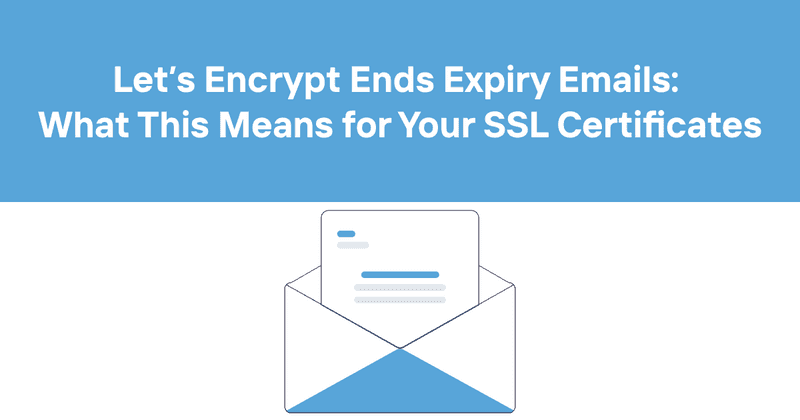Let's Encrypt Ends Expiry Emails: What This Means for Your SSL Certificates
Introduction
Let's Encrypt has announced the end of their certificate expiry email notification service. This significant change affects millions of website owners who rely on these automated reminders to renew their SSL certificates before they expire. The decision marks a major shift in how certificate management must be approached going forward, with implications for website security, user experience, and compliance.
For many developers and site administrators, these emails have been a reliable safety net, preventing the dreaded scenario of unexpected certificate expiration. Now, alternative monitoring solutions become not just helpful but essential.
Let's dive into what this change means and how you can adapt your certificate management strategies to maintain uninterrupted website security.
Table of Contents
- Why Let's Encrypt Is Discontinuing Expiry Emails
- Impact on Website Owners and Administrators
- How Certificate Expiration Affects Your Website
- Alternative Certificate Monitoring Solutions
- Best Practices for SSL Certificate Management
- Setting Up Automated Renewal Systems
- Implementing Third-Party SSL Monitoring
- Future of SSL Certificate Management
- FAQ
- Conclusion
Why Let's Encrypt Is Discontinuing Expiry Emails
Let's Encrypt has become the backbone of web encryption since its launch in 2016, issuing over three billion certificates and helping secure a significant portion of web traffic. The organization's decision to end expiry notification emails stems from several practical considerations:
Growing Volume
The sheer volume of certificates being issued has made email notifications increasingly challenging to manage. Let's Encrypt issues millions of certificates daily, and the corresponding notification system has become an operational burden.
Email Deliverability Issues
Many notification emails were going undelivered due to spam filters, outdated contact information, or email server issues. This created a false sense of security for certificate holders who expected notifications but never received them.
Focus on Automation
Let's Encrypt has consistently advocated for fully automated certificate management. The organization believes the industry should move toward automated renewal processes rather than relying on manual intervention triggered by email reminders.
Resource Allocation
Maintaining the email notification system required resources that Let's Encrypt has decided to redirect toward its core mission of providing free, automated SSL certificates.
The discontinuation isn't immediate - Let's Encrypt is providing a transition period, but site administrators need to prepare for a world without these helpful reminders.
Impact on Website Owners and Administrators
This change disproportionately affects different segments of the web ecosystem:
Small Website Owners
Small businesses and individual website owners who manually renew certificates based on email reminders face the highest risk. Without alternative monitoring systems, they may experience unexpected certificate expirations.
Large Organizations
Enterprise environments typically have more robust monitoring systems in place, but they'll need to verify that these systems are comprehensive and reliable without Let's Encrypt's backup notifications.
Hosting Providers
Web hosting companies that manage certificates for their customers must ensure their internal monitoring systems are failproof or risk affecting hundreds or thousands of websites simultaneously.
The silver lining? This change forces a move toward better certificate management practices industry-wide. What was once a convenience has now become a necessity.
How Certificate Expiration Affects Your Website
Understanding the consequences of certificate expiration helps underscore the importance of proactive monitoring. When an SSL certificate expires:
Security Warnings
Browsers display prominent security warnings to users, often featuring red text, crossed-out padlocks, or other alarming visuals. These warnings significantly deter visitors from proceeding to your site.
| Browser | Warning Type | User Experience Impact |
|---|---|---|
| Chrome | Full-page interstitial | High - Users must click through multiple warnings |
| Firefox | Connection not secure page | High - Similar to Chrome's approach |
| Safari | Cannot establish secure connection | High - Many users immediately leave |
| Edge | Security certificate problems | High - Warning signals potential risk |
Trust Degradation
Even brief periods of expired certificates can damage user trust. Once visitors see security warnings, they may hesitate to return to your site even after the certificate is renewed.
Search Engine Penalties
Google and other search engines factor security into their ranking algorithms. Sites with expired SSL certificates may experience ranking penalties, reducing visibility and traffic.
Payment Processing Issues
E-commerce sites with expired certificates cannot process payments securely. Payment gateways typically refuse connections to sites with invalid SSL certificates.
API Failures
Modern web applications rely on numerous API connections. When certificates expire, these connections break, potentially causing cascading failures throughout your application.
A single expired certificate can transform a thriving website into an inaccessible, untrusted platform in seconds.
Alternative Certificate Monitoring Solutions
With Let's Encrypt's email notifications going away, proactive monitoring becomes essential. Here are robust alternatives to consider:
Certificate Monitoring Services
Dedicated SSL monitoring services can check your certificates at regular intervals and alert you through various channels when expiration dates approach.
These services typically offer:
- Multi-channel alerts (SMS, Slack, email, etc.)
- Customizable warning thresholds (30, 15, 7 days in advance)
- Certificate inventory management
- Validation checks beyond just expiration dates
Internal Monitoring Systems
For organizations with existing monitoring infrastructure, adding SSL certificate checks is relatively straightforward:
DOMAIN="example.com"
EXPIRY= $(openssl s_client -servername $DOMAIN -connect $DOMAIN:443 \
< /dev/null 2>/dev/null | openssl x509 -noout -enddate | cut -d= -f2)
EXPIRY_SECONDS= $(date -d "$EXPIRY" +%s)
NOW_SECONDS= $(date +%s)
DIFF_DAYS= $(( ($EXPIRY_SECONDS - $NOW_SECONDS) / 86400 ))
if [ $DIFF_DAYS -lt 30 ]; then
echo "Warning: Certificate for $DOMAIN expires in $DIFF_DAYS days"
# Add notification logic here
fi
This simple script can be extended and integrated into monitoring platforms like Nagios, Zabbix, or Prometheus.
Automated Certificate Management
The most reliable solution is fully automated certificate management, which aligns with Let's Encrypt's recommendation:
- Certbot: Includes built-in auto-renewal capabilities
- ACME clients: Various clients support automated renewal without human intervention
- Hosting control panels: Many now include automated Let's Encrypt integration
I've worked with organizations that transitioned from manual to automated renewals and found that, after initial setup, the automated approach is not only more reliable but also less time-consuming over the long run.
Best Practices for SSL Certificate Management
Beyond just monitoring, comprehensive certificate management involves several best practices:
Certificate Inventory Management
Maintain a complete inventory of all certificates across your organization. This includes:
- Domain names
- Expiration dates
- Certificate authorities
- Key lengths and algorithms
- Responsible teams or individuals
- Associated applications or services
For larger organizations, this inventory should be stored in a centralized system accessible to all relevant teams.
Standardized Renewal Processes
Establish clear, documented processes for certificate renewal:
- Define renewal thresholds (usually 30 days before expiration)
- Document step-by-step renewal procedures
- Specify backup personnel for each certificate
- Test renewal processes periodically
- Include post-renewal validation steps
Ownership Assignment
Each certificate should have a clearly designated owner responsible for ensuring timely renewals. This prevents the "someone else will handle it" problem that leads to expirations.
Disaster Recovery Planning
Despite best efforts, expirations may still occur. Have a documented emergency response plan:
- Immediate renewal procedures
- Communication templates for users
- Escalation paths for critical certificates
- Post-incident analysis processes
I once worked with a company that experienced a critical certificate expiration affecting their payment portal. The lack of an emergency response plan extended the outage from what could have been 15 minutes to nearly 4 hours, costing thousands in lost revenue.
Setting Up Automated Renewal Systems
Automated renewal is the gold standard for certificate management, especially for Let's Encrypt certificates which are valid for only 90 days. Here's how to implement robust automation:
Using Certbot for Automated Renewals
Certbot remains one of the most popular ACME clients for Let's Encrypt automation:
sudo apt-get update
sudo apt-get install certbot
Set up auto-renewal
sudo certbot --apache # or --nginx for Nginx servers
Test the renewal process
sudo certbot renew --dry-run
Verify the cron job
cat /etc/cron.d/certbot
Certbot creates a twice-daily cron job that attempts renewal only when certificates are nearing expiration (typically within 30 days).
Container-Based Environments
For containerized applications, certificate automation requires special consideration:
- Shared volume approach: Mount certificate storage as a volume shared between a certificate manager container and application containers
- Sidecar pattern: Deploy a certificate management sidecar alongside each application container
- Service mesh: Use service mesh capabilities like Istio to manage certificates centrally
DNS API Integration
For wildcard certificates or servers behind firewalls, DNS validation is often preferable:
sudo certbot certonly \
--dns-route53 \
--domains "*.example.com" \
--preferred-challenges dns-01 \
--email admin@example.com \
--agree-tos \
--non-interactive
Similar plugins exist for most major DNS providers, enabling fully automated renewal without HTTP validation.
Validation and Monitoring
Even with automation, monitoring remains essential:
- Monitor the renewal service itself (not just the certificates)
- Set up alerts for failed renewal attempts
- Periodically test the entire renewal workflow
- Consider a backup notification system independent of your primary automation
I've seen automated systems fail silently due to API changes, server migrations, or expired API credentials. Monitoring your monitoring is just as important as the monitoring itself.
Implementing Third-Party SSL Monitoring
For organizations seeking additional security, third-party monitoring provides an independent verification layer:
Types of Certificate Monitoring
- Simple expiration monitoring: Basic checks for certificate validity periods
- Full certificate validation: Checks the entire certificate chain, revocation status, and algorithm strength
- TLS configuration analysis: Examines the server's security settings beyond just the certificate
- Continuous scanning: Regular checks from multiple global locations
Key Features to Look For
When selecting a monitoring solution, prioritize:
- Flexible notification options (not just email)
- Multi-user access for team environments
- Certificate inventory management
- Historical reporting and trends
- API access for integration with other tools
- Support for internal/private certificates
- Customizable alert thresholds
Integration Options
Modern certificate monitoring tools offer various integration points:
- Status page integration: Display certificate health on public or internal status pages
- Ticketing system integration: Automatically create tickets for approaching expirations
- ChatOps: Send alerts to Slack, Microsoft Teams, or other collaboration platforms
- SIEM integration: Feed certificate data into security information and event management systems
Implementation Steps
- Take inventory of all existing certificates
- Determine appropriate monitoring frequency based on certificate criticality
- Configure notification channels and recipients
- Set up escalation paths for unaddressed warnings
- Conduct trial expirations to verify the monitoring system works
- Document the monitoring architecture for team reference
A strategic implementation considers certificate criticality - not all certificates require the same monitoring intensity. Your payment gateway certificates might justify checks every few minutes, while internal dev environments might be fine with daily checks.
Future of SSL Certificate Management
The industry is evolving beyond just automation toward more comprehensive approaches:
Certificate Lifecycle Management
Modern solutions address the entire certificate lifecycle:
- Discovery of unknown certificates
- Automated provisioning
- Continuous monitoring
- Automated renewal
- Revocation management
- Compliance reporting
Zero-Trust Architecture Integration
Certificate management is increasingly viewed as part of broader zero-trust architectures:
- Machine identity management
- Just-in-time certificate issuance
- Integration with service mesh technologies
- Short-lived certificates with automatic rotation
Cloud-Native Approaches
Kubernetes and other cloud-native platforms offer native certificate management:
- Cert-manager for Kubernetes clusters
- AWS Certificate Manager for AWS resources
- Azure Key Vault certificates for Azure environments
- HashiCorp Vault PKI secrets engine for dynamic certificate generation
The trend is clear: certificate management is becoming infrastructure-as-code, with declarative configurations replacing manual processes.
FAQ
How long do Let's Encrypt certificates last?
Let's Encrypt certificates are valid for 90 days from the date of issuance. This relatively short lifespan is by design, encouraging automation and frequent renewal.
Will Let's Encrypt stop issuing certificates?
No, Let's Encrypt is not stopping certificate issuance. They are only discontinuing the courtesy email reminders about expiring certificates.
How can I check when my certificate expires?
You can check your certificate expiration date using various methods:
openssl s_client -servername example.com -connect example.com:443 < /dev/null 2>/dev/null | openssl x509 -noout -dates
# Using browser tools
# Chrome: Click padlock icon > Certificate > Valid from
# Firefox: Click padlock icon > Connection secure > More Information > View Certificate
What happens if my certificate expires?
When a certificate expires, browsers will display security warnings to users, APIs may stop functioning, and security-conscious systems will refuse to connect to your site.
How far in advance should I renew my certificates?
Most experts recommend renewing certificates at least 30 days before expiration. For critical systems, consider even earlier renewal thresholds.
Can I still use Let's Encrypt if I don't receive expiry emails?
Yes, you can still use Let's Encrypt certificates. You'll just need to implement alternative monitoring or (preferably) automated renewal systems.
Are there alternatives to Let's Encrypt?
Yes, several alternative certificate authorities offer free or low-cost SSL certificates:
- ZeroSSL
- Buypass
- SSL.com (offers free certificates for certain use cases)
- Many web hosting providers include free SSL certificates
Conclusion
Let's Encrypt's decision to end expiry notification emails signals a maturation of the certificate management ecosystem. While it removes a safety net many have relied on, it also encourages more robust, automated approaches to certificate management.
The most successful organizations will view this change as an opportunity to improve their overall security posture through:
- Comprehensive certificate inventory
- Fully automated renewal processes
- Independent monitoring systems
- Clear ownership and responsibility assignments
- Documented emergency procedures
For those managing numerous websites or applications, this transition is the perfect time to investigate specialized SSL monitoring tools like Odown, which offers comprehensive SSL certificate monitoring alongside website and API uptime monitoring.
Odown provides real-time alerts across multiple channels, customizable notification thresholds, and public status pages that can display certificate health alongside other system metrics. This integrated approach ensures that certificate management becomes part of your overall system reliability strategy rather than a separate concern.
Whether you choose to build internal monitoring systems or leverage third-party solutions like Odown, the key is to act now, before the Let's Encrypt email notifications disappear completely. The temporary inconvenience of setting up new monitoring systems pales in comparison to the potential damage of unexpected certificate expirations.
In the modern web landscape, SSL certificate management isn't just an IT maintenance task—it's an essential component of your security architecture, user experience, and brand reputation.



